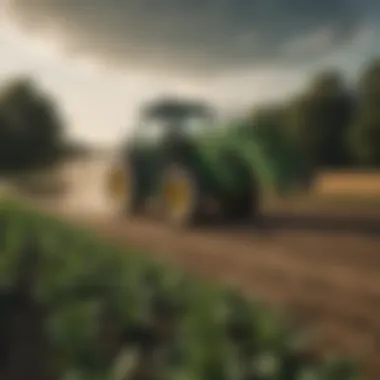Exploring John Deere's Impact in Jefferson City, MO


Intro
In the realm of agriculture, few names resonate as strongly as John Deere. In Jefferson City, Missouri, this brand holds a critical position, impacting not only the local economy but also the agricultural practices that define the region. Established in the 19th century, John Deere has continuously evolved its product offerings to meet the changing needs of farmers and agricultural professionals. This article seeks to explore the significance of John Deere in Jefferson City by delving into its historical background, product range, community involvement, and contributions to the agricultural sector.
Key Concepts and Terminology
Understanding John Deere's operations in Jefferson City requires familiarity with some fundamental concepts in agriculture and manufacturing.
Definition of Terms
- Tractor: A key piece of equipment used in farming, designed to pull heavy loads and implement various attachments for tasks such as plowing and planting.
- Precision Agriculture: This refers to the use of technology—like GPS and data analytics—to optimize field-level management regarding crop farming.
- Sustainability: A practice that emphasizes meeting the needs of the present without compromising the ability of future generations to meet theirs. In agriculture, this often involves efficient resource management.
Overview of Relevant Practices
The agricultural landscape is shifting toward more sophisticated methodologies and practices:
- Soil Management: Understanding soil health is vital for crop yield.
- Crop Rotation: Diversifying crops to maintain soil fertility and health.
- Integrated Pest Management: Combining different pest control techniques to minimize environmental impact.
Knowledge of these terms and practices establishes a foundation for exploring John Deere's role in Jefferson City.
Current Trends and Innovations
The agricultural sector is evolving rapidly, influenced by technology and changing consumer preferences.
Latest Research and Developments
John Deere continually invests in research to improve its products. This includes:
- Enhancing fuel efficiency in tractors.
- Developing smarter sensors for precision farming.
- Creating user-friendly interfaces that make machinery easier to operate.
These advancements aim to support farmers in increasing productivity while minimizing environmental impacts.
Emerging Technologies and Tools
Innovation is driving change in the way farmers operate:
- Drones: Used for aerial monitoring and assessing crop health.
- Automation: Automatic steering systems are gaining popularity for their precision.
- Data Analytics: Tools that provide insights into crop performance, helping farmers make informed decisions.
These technologies are reshaping the agricultural landscape in Jefferson City and beyond.
Practical Applications
For agricultural professionals and enthusiasts, understanding the practical aspects of utilizing John Deere products is essential. Below are some helpful insights:
Step-by-Step Guides
Using a John Deere Tractor for Planting:
- Preparation: Ensure that all tools are calibrated and in working order.
- Field Selection: Choose the appropriate field based on soil moisture and crop type.
- Setting Up: Adjust the tractor settings as per the manufacturer's guidelines.
- Monitor: Keep an eye on performance during operation.
Troubleshooting Common Issues
When operating John Deere machinery, you may encounter issues like:
- Engine Problems: Listen for unusual sounds or loss of power.
- Hydraulic Failures: Check fluid levels and for any leaks in the hydraulic system.
In such cases, consulting the user manual can provide specific troubleshooting steps.
"John Deere's commitment to innovation has proven critical for farmers seeking sustainable solutions." - Industry Expert
Understanding John Deere's influence in Jefferson City is vital for appreciating its role in agriculture. As new technologies emerge, this legacy of innovation continues to support and empower local farmers, ensuring a productive future.
Prolusion to John Deere
The focus on John Deere within Jefferson City constitutes a significant exploration of both regional agriculture and its mechanization. John Deere, established in 1837, has grown beyond merely a brand; it embodies innovation in farming practices and equipment. In this discussion, we aim to highlight key aspects of John Deere's presence, particularly its significance in the local agricultural landscape.
Understanding the introduction of John Deere is essential for recognizing its role in both historical context and current operations. John Deere’s resonance in Jefferson City illustrates a fusion of technological progress with community needs. This link begs the consideration of how agricultural practices have evolved since the inception of this company. Each John Deere product, from tractors to implements, plays a role in shaping agricultural efficiency, which is vitally important for local farmers.
Moreover, John Deere’s influence extends beyond equipment supply. Their commitment to supporting agricultural professionals through innovation contributes directly to the local economy. By providing reliable machinery and services, John Deere not only aids farmers in maintaining productivity but also fosters community growth. This notion is pivotal for anyone exploring agricultural advancements in Jefferson City.
Overall, the introduction of John Deere emphasizes its enduring legacy and enduring impact on both agriculture and the community at large. The emphasis on high-quality equipment is not merely about machinery; it reflects an ongoing technological revolution that continues to redefine farming practices.
Historical Overview of John Deere
Understanding the historical context of John Deere provides insight into its significant role in agriculture and its evolution over the years. John Deere’s rich history is marked by innovation and an unyielding commitment to farming. This section will explore two decisive phases: the company's founding and early years, followed by its robust expansion and innovation.


Founding and Early Years
John Deere was founded in 1837 by blacksmith John Deere in Grand Detour, Illinois. At the time, farmers struggled with the available steel plows, which were largely inefficient in the tough soil of the Midwest. Deere recognized this gap and set out to create a plow that would work more effectively. His design, a polished, high-carbon steel plow, was a breakthrough; it cut through the soil with ease, reducing the effort needed for planting.
The initial response to Deere's plow was overwhelmingly positive, and demand grew quickly. By the late 1840s, John Deere's company had become a recognized name in agricultural equipment. By moving the factory to Moline, Illinois, John Deere positioned the company closer to its customer base. This move laid the groundwork for its future success. The innovation during these early years was not just in product design but also in understanding customer needs. The focus on durable and efficient farming tools naturally built a loyal customer following.
Expansion and Innovation
As the years progressed, John Deere did not rest on its laurels. The company expanded its operations beyond plows, significantly diversifying its product range. The end of the 19th century saw Deere introducing seeders, cultivators, and later, tractors. With each new product, John Deere integrated advanced engineering techniques. This innovation continued through the 20th century with adaptations to include internal combustion engines and hydraulic systems, which revolutionized farm machinery.
During this period, John Deere's commitment to quality and efficiency helped solidify its status in the agricultural industry. The brand became synonymous with reliability among farmers, a reputation cultivated through careful product development and customer engagement. Key acquisitions also played a role during this phase. By acquiring companies, John Deere expanded its technological capabilities, integrating cutting-edge solutions into their machinery.
Overall, this historical overview sets the stage for understanding John Deere's profound impact in Jefferson City. The company's roots and evolution reflect a continuous commitment to meet the needs of farmers, ensuring their farming practices remain productive and sustainable.
John Deere's Impact in Jefferson City
John Deere holds significant relevance in Jefferson City, Missouri, influencing both the local economy and the agricultural landscape. The company's presence not only fuels job creation but also shapes the agricultural practices adopted by local farmers. This subsection elaborates on several critical components of John Deere's impact in this area, focusing on economic contributions and the broader influence on farming within the community.
Economic Contributions
The economic footprint of John Deere in Jefferson City is profound. The company contributes to the ecosystem in various dimensions, each fostering growth and sustainability for the local populace. Since its inception, John Deere has stimulated local employment, directly and indirectly aiding the job market.
The range of jobs created includes everything from manufacturing positions to sales and service roles at local dealerships. This not only supports the local economy but retains talent within the region. Many employees benefit from competitive wages and professional growth opportunities, which further enhances the standard of living in Jefferson City.
"John Deere is not just a brand; it has become a cornerstone of our community’s economic infrastructure. Its contributions can be felt throughout Jefferson City."
— Local Business Owner
In addition to employment opportunities, John Deere contributes through taxes that enhance public services. Local governments benefit from the taxes generated through both the company and its associated dealer network. This revenue supports education, infrastructure, and community programs, leading to a healthier and more engaged citizenry.
Moreover, John Deere's products enable farmers to enhance their productivity and efficiency. The advanced machinery helps farmers maximize crop yields, directly impacting the agricultural output of the area. Enhanced efficiency in farming techniques contributes to a more robust agricultural economy, leading to seasonal profitability. This profitability often circulates within Jefferson City, reinforcing local businesses and the community.
Key points regarding John Deere's economic contributions include:
- Job Creation: Significant opportunities in manufacturing, sales, and service.
- Tax Revenue: Supports public services through local and state taxes.
- Enhanced Agricultural Productivity: Advanced machinery increases efficiency and crop yields which boosts the local economy.
Overall, John Deere's impact goes beyond just numbers. The company's commitment to supporting the local workforce and enhancing agricultural practices resonates throughout Jefferson City, establishing a legacy of innovation, growth, and sustainability.
Product Range Offered
The product range of John Deere is a crucial area of focus when evaluating its impact and significance in Jefferson City, Missouri. This range often dictates how effectively farmers and landscaping professionals can fulfill their tasks. John Deere's offerings position them as leaders in the agricultural and landscaping equipment market. Their diverse catalogue provides solutions tailored to various needs, ensuring efficiency and productivity in farm operations and beyond.
Agricultural Equipment
John Deere excels in manufacturing a broad array of agricultural equipment. This includes tractors, combines, and plows. Tractors, for instance, are available in different sizes and capabilities. These tractors serve as the backbone for many farms, facilitating a variety of tasks such as tilling, planting, and harvesting.
Other key offerings include the John Deere 8R Series Tractors, which combine power and technology. The innovative CommandPro™ control is notable. It allows operators to easily manage tasks with the touch of a button. The integration of precision agriculture technologies into these machines offers significant advantages, including increased yield and reduced waste.
Benefits of Agricultural Equipment:
- Enhanced productivity due to advanced functionality.
- Durable design ensures longevity in the field.
- Integration with technological solutions enables smarter farming.
The equipment range supports local farmers in their efforts to maximize output while reducing operational costs. Having the right tools can elevate a farm's performance. This is essential in today’s competitive market.
Landscaping Tools
Alongside agricultural machinery, John Deere also provides landscaping tools designed for both commercial and residential use. Their lineup includes mowers, utility vehicles, and gardening implements. For example, the John Deere ZTrak™ zero-turn mowers allow users to maneuver easily around obstacles. This feature is especially important for landscape maintenance in urban settings.
Moreover, these landscaping tools are engineered for efficiency, designed to reduce fuel consumption and increase productivity. They offer various attachments and customizable features, allowing users to adapt tools to specific tasks such as aerating or mulching efficiently.
Advantages of Landscaping Tools:
- Flexibility to handle diverse landscaping projects.
- Engineered for fuel efficiency and reduced emissions.
- Strong support network through local dealers enhances user experience.
Each piece of equipment is backed by the company's commitment to quality and innovation. John Deere ensures their products are not just reliable but also sustainable. This approach resonates well with environmentally conscious consumers and communities.
"Investing in the right machinery can transform farming and landscaping operations, leading to greater efficiency and sustainability."
In summary, the diverse product range offered by John Deere significantly impacts agricultural and landscaping sectors in Jefferson City, Missouri, showcasing their commitment to innovation and community support.
Community Engagement Initiatives
Community engagement is a critical aspect of a company's role in fostering positive relationships with its surrounding environment. For John Deere in Jefferson City, this involves a structured approach to involve the local community in various activities that enhance both social and economic well-being. John Deere's initiatives focus not only on agricultural advancements but also on supporting local events and causes that resonate with the community's interests.
Local Events and Sponsorships
John Deere's participation in local events and sponsorships reflects its commitment to the Jefferson City community. This connection brings numerous benefits:


- Boosting Local Economy: By supporting local events, John Deere contributes to the economic vigor of Jefferson City. These events can lead to increased foot traffic in businesses, providing a boost to local merchants.
- Building Brand Loyalty: Community sponsorship builds trust. When John Deere invests in local activities, it creates goodwill and enhances its brand presence among potential customers.
- Promoting Agricultural Education: Many of the sponsored events focus on educating the public about sustainable farming and the latest agricultural technologies. This fulfills a dual purpose of marketing and community education.
In recent years, John Deere has sponsored various farming fairs and educational workshops. These events serve as a platform for local farmers to learn about innovative farming techniques and equipment. They also allow the community to come together, fostering a sense of unity and shared purpose.
Furthermore, John Deere actively supports youth programs such as 4-H and FFA (Future Farmers of America). These organizations contribute to developing the next generation of agricultural professionals. Supporting such initiatives helps cultivate skills and instills a sense of responsibility in young individuals.
"Investing in the community goes beyond just business; it’s about nurturing future generations and fostering growth everywhere," explains a John Deere representative.
The company's approach is not only beneficial for them but serves as a model for other businesses on how to engage effectively with their communities.
Sustainability Practices
Sustainability practices are essential for any modern agricultural entity, including John Deere. In Jefferson City, Missouri, where agriculture forms a vital part of the local economy, these practices contribute significantly to environmental stewardship and operational efficiency. As farmers face increasing pressure to produce high yields while minimizing environmental impact, John Deere’s focus on sustainability becomes increasingly pertinent. This section will explore various aspects of sustainability practiced by John Deere, especially in relation to its presence in Jefferson City.
Environmental Responsibility
John Deere demonstrates environmental responsibility through various initiatives aimed at reducing carbon footprints and preserving natural resources. The company actively invests in research and development of products that are designed to be more energy-efficient. For instance, the latest models of tractors and other machinery come equipped with advanced engines that consume less fuel and emit fewer pollutants.
Furthermore, John Deere emphasizes responsible sourcing of materials. This includes using recycled materials in manufacturing where feasible and ensuring their suppliers adhere to strict environmental guidelines. The commitment to environmental responsibility also extends to waste management practices within their facilities. By implementing recycling programs and reducing hazardous waste, they contribute to a more sustainable production cycle.
"John Deere’s commitment to reducing its environmental impact is a vital part of its operations."
Sustainable Farming Initiatives
Sustainable farming initiatives are crucial in supporting local farmers to adopt environmentally friendly practices. John Deere plays an instrumental role in promoting such initiatives in Jefferson City. One approach is the introduction of precision agriculture technologies. These technologies assist farmers in utilizing resources more efficiently. For example, farmers can analyze soil conditions and crop health to decide where to invest in fertilizer and water, avoiding excess use that could harm the environment.
Additionally, John Deere supports educational programs aimed at teaching farmers about sustainable practices. Workshops and seminars are often held to address topics such as crop rotation, cover cropping, and integrated pest management. By equipping farmers with the knowledge to implement sustainable practices, John Deere fosters a community of environmentally conscious agricultural professionals.
Technological Innovations
In a rapidly evolving agricultural landscape, technological innovations stand at the forefront of improving productivity and efficiency. John Deere remains pivotal in integrating technology into farming practices. The adoption of advanced technologies not only benefits farmers but also addresses emerging challenges within the agricultural sector. These innovations enable farmers to make data-driven decisions, leading to optimized resources and better yields.
Precision Agriculture Technologies
Precision agriculture technologies include methods that enhance farming efficiency through data analysis and technology integration. Key elements of this approach involve:
- GPS Technology: This allows farmers to map fields and monitor crop health effectively.
- Drones and UAVs: These devices are increasingly used for crop surveillance, providing aerial imagery that supports crop management decision-making.
- Soil Sensors: They measure moisture and nutrient levels in real-time, ensuring that crops receive the ideal conditions for growth.
The benefits of precision agriculture technologies are substantial. Farmers can draw insights from data to tailor their farming practices to specific field conditions. This leads to reduced waste of resources such as water and fertilizer, fostering a more sustainable approach to farming. For example, farmers utilizing these technologies may report a 20% decrease in water consumption on average, underscoring the effectiveness of these tools in achieving both economic and environmental goals.
Smart Farming Solutions
Smart farming solutions are closely linked to precision agriculture. These solutions focus on connecting various farm equipment and devices through the Internet of Things (IoT). Some examples include:
- Automated Tractors: They enhance operational efficiency by reducing the need for manual labor in the field.
- Remote Monitoring Systems: These allow farmers to track equipment performance and crop health from anywhere, ensuring timely interventions.
The implementation of smart farming technologies provides significant advantages. Farmers can expect greater operational efficiency and can respond more rapidly to changes in field conditions. Moreover, integrating AI and machine learning into farming systems leads to predictive analytics, enabling farmers to anticipate issues before they arise. This capability significantly reduces downtime and maintenance costs, representing a transformative shift in how modern agriculture operates.
"Investing in state-of-the-art technologies is no longer a luxury; it is a necessity for farmers aiming to remain competitive in today’s market."
Training and Support Services
Training and support services play a crucial role in making John Deere's equipment effective for farmers in Jefferson City. Such services ensure that end-users are well-equipped to operate machinery efficiently and safely. When farmers understand how to utilize their tools, they can maximize productivity and minimize operational errors.
Dealer Support Structures
Dealer support structures are essential components of John Deere's overall service framework. John Deere dealers across Jefferson City provide vital services that enhance customer experience. They are the first point of contact for any inquiries about equipment functionalities or troubleshooting.
- Access to Expertise: Local dealers train their staff to be knowledgeable in various John Deere products. They offer valuable insights tailored to specific equipment needs, ensuring customers receive personalized service.
- Inventory Management: Dealers maintain a stock of vital parts and new machinery. Quick access to these resources minimizes downtime for farmers, allowing them to remain productive.
- Responsive Communication: Local dealers are more reachable compared to distant support options. This accessibility ensures timely assistance for urgent needs, maintaining farm operations without significant interruptions.
In addition, these dealers often host community events. These gatherings promote a better understanding of John Deere products while fostering relationships between the company and its clients.
Customer Training Programs
John Deere's customer training programs are designed with a clear focus: to empower users with knowledge and skills regarding their equipment. These programs are not merely informative; they are hands-on training that enhances usability.
- Workshops and Seminars: John Deere organizes various workshops, helping users familiarize themselves with the latest technology and equipment features. These training sessions cover practical aspects of operating machinery safely and efficiently.
- Online Resources: The company offers online training modules, making education accessible for all customers. Farmers can learn at their own pace and revisit complex topics as needed.
- Field Training: On-site training ensures that operators are comfortable with new machinery in their actual working environment. This practical approach enhances confidence and allows immediate application of learned skills.
John Deere’s commitment to support is reflected in these training initiatives. They are essential for customer satisfaction and operational efficiency.
"Proper training enables users to harness the full potential of John Deere equipment, leading to more productive farming practices."
As the landscape of agriculture evolves, these training and support services remain critical. They empower local farmers to adapt to new technologies and methodologies, ensuring sustainability and progress in the agricultural sector.
Challenges Faced by John Deere


In the competitive world of agriculture, John Deere, despite its established history and reputation, confronts various challenges that influence its operations and market positioning in Jefferson City, Missouri. Understanding these challenges is crucial for grasping the broader dynamics that affect both the company and the agricultural sector. By identifying market pressures, regulatory hurdles, and technological advancements, one can appreciate how these factors shape John Deere's strategies and outcomes.
Market Competition
The agricultural equipment market is highly competitive. John Deere faces significant threats from several rival companies. Brands like Case IH, Agco, and New Holland present strong alternatives, often competing on price, technology, and innovative features. The presence of these competing brands encourages John Deere to keep evolving its products and services to maintain its market leadership.
One critical aspect of competition is pricing. As prices fluctuate based on global supply and demand, John Deere needs to strategically adjust its pricing models. This could affect profit margins and customer acquisition. Additionally, new entrants into the market introduce advanced technologies and lower-priced alternatives. Such developments can shift customer loyalty and expectations.
Several strategies have been deployed to counteract competition effectively:
- Continuous Innovation: John Deere invests significantly in research and development to enhance its product offerings. Keeping pace with technological advancements, such as autonomous machinery or precision farming tools, is essential. This innovation helps to meet the evolving needs of farmers.
- Brand Loyalty: The John Deere brand is synonymous with quality and reliability. Building brand loyalty is crucial, as satisfied customers often return for new equipment and refer peers.
- Diverse Product Range: Offering a broad spectrum of equipment that caters to various farming techniques can attract a wider customer base. This ranges from tractors to harvesters, allowing farmers to find solutions suited uniquely to their needs.
"Keeping ahead in a competitive market requires both a keen understanding of competitors and a commitment to our core values of quality and service."
In summary, market competition poses significant challenges for John Deere in Jefferson City. However, leveraging innovation, brand loyalty, and diversifying product offerings can offer vital pathways to navigate these obstacles successfully.
Future Outlook
The future outlook for John Deere in Jefferson City is a significant component of understanding its overall impact on the agricultural sector. As agriculture continues to evolve, so too must the companies that supply essential equipment and services. John Deere is positioned to lead in this transformation by aligning its strategic goals with emerging trends in technology and sustainability.
Strategic Goals
John Deere's strategic goals in Jefferson City are generally focused on innovation, customer satisfaction, and market growth. The company aims to maintain its leadership role through:
- Investment in New Technology: Continued advancement in machinery, such as precision agriculture tools, is critical. This not only increases efficiency but also enhances crop yields for local farmers.
- Collaboration with Local Farmers: Building relationships ensures that their products respond accurately to the needs of the agricultural community. Feedback from farmers helps improve product design and functionality.
- Sustainability Initiatives: John Deere is committed to promoting environmentally friendly practices. This includes focusing on reducing emissions and improving fuel efficiency in their equipment.
"Innovation and collaboration with farmers are key components of our future at John Deere," says a company representative in Jefferson City.
These goals emphasize adaptability and a forward-thinking approach, aiming to create long-term value for both the company and the agricultural community.
Innovative Trends in Agriculture
The agricultural industry is currently witnessing several innovative trends, which John Deere actively incorporates into its operations.
- Smart Farming Technologies: These include IoT (Internet of Things) devices that provide real-time data to farmers, aiding in decision-making. This technology allows farmers to monitor crop health and manage resources more effectively.
- Data-Driven Agriculture: The use of big data analytics helps farmers to optimize their practices. John Deere offers solutions that aggregate data from various sources, enabling farmers to analyze trends and forecast outcomes.
- Sustainable Practices: There is a notable trend toward sustainable farming, which John Deere supports by developing equipment that helps reduce soil erosion and conserve water.
By aligning their innovations with the current needs and trends, John Deere positions itself to thrive in a competitive market. This strategic foresight not only benefits their business but also supports local farmers in Jefferson City.
Customer Perspectives
Understanding customer perspectives is crucial in evaluating John Deere's influence and reputation in Jefferson City. This section highlights the voices of those who engage with the brand, particularly in the agricultural community. Customer testimonials offer insight into how John Deere products and services align with the needs of farmers and landowners. These experiences can help potential buyers assess the equipment's reliability, efficiency, and overall value.
Client Testimonials
Client testimonials provide a window into the real-world functioning of John Deere machinery and support services. Many users express satisfaction based on several factors such as durability, ease of use, and customer service. Here are some common themes reflected in customer feedback:
- Durability and Reliability: Users often mention the long-lasting nature of John Deere equipment. A farmer from Central Jefferson City noted, "I have been using John Deere tractors for years, and they withstand tough conditions like no other."
- Innovative Features: Many clients appreciate the technology embedded in John Deere products. Advanced features such as GPS tracking and precision guidance are frequently highlighted. A local landscaper remarked, "The smart farming solutions make my work easier and more efficient. It's a game-changer."
- Customer Support: Testimonials often commend the customer service experience. Clients emphasize easy access to support resources and knowledgeable staff at local dealerships. As one Jefferson City resident stated, "Whenever I have questions, the team at the dealership is always ready to help. Their support is unmatched."
- Community Focus: Customers also recognize John Deere's commitment to community engagement. Client feedback indicates that farmers value a company that invests in local initiatives. The sentiment is well expressed in the words of a local grain farmer, stating, "John Deere isn't just about selling us equipment; they care about our community and support our local events."
These testimonials not only shed light on customer satisfaction but also convey the brand's role in supporting agricultural growth in the region. This feedback helps prospective customers understand what they can expect in terms of product performance and service quality, ultimately influencing their purchasing decisions.
"Customer experience is a significant aspect of any brand's reputation. For John Deere, positive testimonials reinforce their standing in the agricultural market."
Collaborations and Partnerships
Collaborations and partnerships are fundamental to John Deere's operation in Jefferson City. These relationships foster innovation and growth, creating a synergy that benefits both John Deere and the local agricultural community. By working closely with various stakeholders, John Deere enhances its ability to deliver tailored solutions that meet the specific needs of farmers in this region.
Effective partnerships can lead to several significant advantages:
- Resource Sharing: Collaboration between John Deere and local entities allows for sharing valuable resources. This can include technology, information, and even funding.
- Knowledge Exchange: Engaging with local farmer associations provides John Deere insights that improve product development. Farmers share feedback on equipment and best practices that can be transformative for the company’s offerings.
- Community Development: Partnerships can lead to community-focused initiatives that strengthen local economies. By investing in education and training programs, John Deere supports sustainable farming practices.
Overall, cultivating partnerships enhances operational capabilities. As the agricultural landscape shifts due to innovation and market trends, nurturing these relationships becomes even more crucial.
Local Farmer Associations
Local farmer associations represent a key collaboration point for John Deere in Jefferson City. These associations comprise groups of farmers sharing common goals and challenges in agriculture. Their interconnectedness enriches the agricultural community.
John Deere’s engagement with these associations leads to various benefits:
- Tailored Products: By integrating feedback from farmers, John Deere customizes its products. This ensures that the equipment aligns closely with the practical needs of local farmers.
- Education Programs: Collaborating with associations enables John Deere to organize workshops and seminars. These programs focus on new agricultural technologies and techniques, keeping farmers abreast of innovative practices.
- Networking Opportunities: Such partnerships cultivate a network of support among farmers. They can share insights and strategies that enhance collective success.
"By working together, we can achieve significant advancements in agriculture that benefit all stakeholders involved."
As the agricultural sector continues to evolve, strong ties between John Deere and local farmers remain essential. They pave the way for enhanced innovation, product relevance, and sustainable agricultural practices in Jefferson City.
Culmination
In assessing the influence of John Deere in Jefferson City, we find a tapestry woven with historical significance and contemporary relevance. The brand’s long-standing commitment to agriculture not only shapes the local economy but also enhances the community through various initiatives. Understanding this impact is vital for agricultural professionals and enthusiasts, as it provides insight into how a leading name like John Deere continues to innovate and engage with its client base.
Summarizing Key Takeaways
- Historical Impact: John Deere has a rich history in Jefferson City that dates back many years, shaping the agricultural landscape.
- Economic Contributions: The company's presence contributes significantly to the local economy, providing jobs and supporting local suppliers.
- Product Range: John Deere offers a variety of agricultural equipment and landscaping tools tailored to meet the needs of farmers and landowners.
- Community Engagement: Active participation in local events and sponsorships highlights the company’s commitment to community welfare.
- Sustainability Practices: John Deere's initiatives in sustainable agriculture reflect a forward-thinking approach to farming, catering to environmentally conscious consumers.
- Technological Innovations: The brand continues to lead with advancements in precision agriculture and smart farming technologies, providing farmers with tools to increase efficiency and yield.
- Training and Support: Comprehensive training programs and dealer support systems ensure that customers are well-equipped to utilize their products effectively.
- Future Outlook: John Deere’s strategic goals focus on maintaining relevance in a competitive market while fostering innovation within the agricultural sector.
The importance of understanding these elements cannot be understated, as they encapsulate not only the operational dynamics of John Deere in Jefferson City but also the broader implications on sustainable farming practices and economic resilience in the face of evolving challenges.







